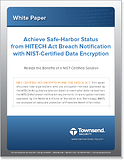Breach Notification Safe-Harbor
|
An alarming number of security breaches have occurred in the last decade victimizing families of military personnel, who belong to TRICARE. Since the fall of 2009, over 400 breaches have occurred. At least 500 people have been directly affected and another 50,000 smaller scale breaches have been reported to the government. The community of Palo Alto, California was hit closest to home, when over 20,000 names of emergency room patients were available on an online public forum before the list was discovered by authorities. For several months, all these people were susceptible to a profusion of afflictions such as identity theft, credit card fraud or fraud against Medicare and Medicaid programs. Just one move can financially ruin a family.
One major cause of the breach was that security tapes were stolen from the car of a TRICARE employee, and these backup tapes had people’s private information on them. The big problem of course, was that after these tapes were stolen, the information was readily available to pirates. Any encryption didn’t exist, so the information was just there for the taking. If the data on these tapes was encrypted, TRICARE wouldn’t have to worry about the tapes being stolen and you wouldn’t be hearing about this problem – HIPAA grants a breach notification safe harbor to organizations who are encrypting their sensitive data.
If you aren’t familiar with HIPAA (The Health Insurance Portability and Accountability Act), it was established in 1996 and its main focus is to protect the rights to health insurance for families when the wage earner was to change or lose a job. It’s second objective focuses on standards for electronic health care transactions. With HIPAA, there are legal regulations that the government has put in place to protect our Personal Health Information (PHI). While there is no encryption requirement, it is strongly considered a best practice.
The largest concern when a story like this breaks is for the victims. The Federal Trade Commission (FTC) has published a few tips for individuals who are affected from the TRICARE breach:
- Don’t willingly give out personal information over the phone unless you know exactly whom you are dealing with.
- Increase the frequency at which you check over your medical records to make sure nothing looks out of the ordinary.
- Any fraudulent report you notice should be reported to the police immediately.
The TRICARE breach should be an example of why encryption should be mandatory for organizations that deal with PHI. Not only does it protect the privacy of your customers, when a breach does happen, HIPAA grants you a breach notification safe harbor.
Learn more about encryption and key management best practices for HIPAA and HITECH Act in our white paper titled "Achieve Safe-Harbor Status from HITECH Act Breach Notification".


